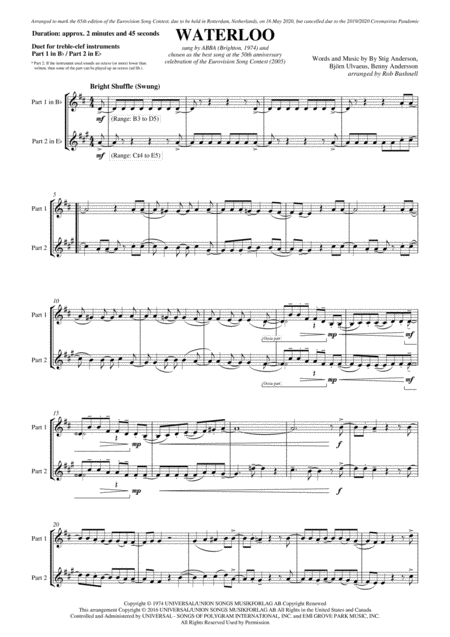Instrumental Duet Instrumental Duet - Level 3 - Digital Download SKU: A0.752408 By ABBA. By Benny Andersson, Bjorn Ulvaeus, and Stig Anderson. Arranged by Rob Bushnell. Broadway,Contemporary,Contest,Festival,Musical/Show,Pop. Score and parts. 2 pages. RBMusic #5795229. Published by RBMusic (A0.752408). On 6 April 1974, the 1974 Eurovision Song Contest took place in Brighton, UK. It should have been held in Luxembourg but, after having won in both 1972 and 1973, they declined to stage the contest in 1974 on the grounds of the expense to host it for a second consecutive year; the BBC agreed to stage it. Drawn 8th, the conductor for the Swedish, Sven-Olof Walldoff, comes on stage dressed as Napoleon. The music starts, and less than 3 minutes later, history was made. This was the year that ABBA won with Waterloo and the victory began their path to worldwide fame. Waterloo is the first single from ABBA's second album, Waterloo, and is the first to be credited to the group performing under the name ABBA. It became a No.1 hit in several countries, including the UK, and went on to sell nearly six million copies, making it one of the best-selling singles in history. At the 50th anniversary celebration of the Eurovision Song Contest in 2005, it was chosen as the best song in the competition's history. It has been recorded in English, Swedish, French, German and Finnish – it was the first winning entry to Eurovision in a language other than that of their home country (with rules concerning language having been relaxed in 1973). Waterloo was released on 1 June 2018 as the second single from the Mamma Mia! Here We Go Again soundtrack, performed by Hugh Skinner and Lily James. Arranged to mark the 65th edition of the Eurovision Song Contest, due to be held in Rotterdam, Netherlands, on 16 May 2020, but cancelled due to the 2019/2020 Coronavirus Pandemic. It is designed for two treble-clef instruments (part 1 in Bb and part 2 in Eb). This version is in C major (concert pitch) – part 1 has a written range from B3 to D5 and part 2 has a written range from C#4 to E5. (For other parts/versions, see my other Waterloo titles.) A recording of the original song can be found here on YouTube: https://www.youtube.com/watch?v=Sj_9CiNkkn4. Other searchable terms: Agnetha Fältskog, Björn Ulvaeus, Benny Andersson, Anni-Frid Lyngstad, Sweden, United Kingdom, England, Ring Ring, Melodifestivalen, Janne Schaffer, Rutger Gunnarsson, Ola Brunkert, Claude-Michel Schönberg, Les Misérables, London, Battle of Waterloo, 1815, Hasta Mañana, Wizzard, Cher, The Martian, Matt Damon
